|
|
|
Sort Order |
|
|
|
Items / Page
|
|
|
|
|
|
|
| Srl | Item |
| 1 |
ID:
118015
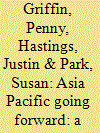

|
|
|
|
|
| Publication |
2013.
|
| Summary/Abstract |
As one of the preeminent academic conferences on international studies in the Asia Pacific, the 2012 Oceanic Conference on International Studies, held at the University of Sydney (with co-sponsors at the University of New South Wales, the University of Technology, Sydney, and Macquarie University) from 18 to 20 July, played host to a large number of academics and international analysts who presented research on a variety of international studies topics. After a very successful conference in Auckland that emphasized the connection of the OCIS community to the Oceanic region, it seemed fitting that the conference would come to Sydney, the largest city in the Oceanic region, and one of the premier global cities in the Asia Pacific. In part because of the location of the conference, and because of the emphasis of many of the conference presentations on the Asia Pacific, no doubt inspired by underlying trends that are both exciting and worrying (sometimes at the same time), the organizers decided to focus this special issue of Global Change, Peace and Security on the challenges that the Asia Pacific faces, now and in the future. In short, this special issue is about the Asia Pacific going forward.
|
|
|
|
|
|
|
|
|
|
|
|
|
|
|
|
| 2 |
ID:
118018


|
|
|
|
|
| Publication |
2013.
|
| Summary/Abstract |
Carbon offsets produced from terrestrial (land-based) emissions reduction projects are a contested frontier of carbon market expansion. Experiments in legislating for and producing terrestrial offsets that come under the title REDD+ have met heated opposition. However, a political consensus about the desirability and feasibility of carbon offsets from avoided deforestation and various land-management practices has slowly emerged. How do terrestrial carbon offsets gain legitimacy in the face of contestation and compelling evidence that creating carbon commodities from land ecosystems is an elusive commodity fiction? It seems that a quiet compromise is emerging over the (re-)commodification of land through carbon trading vis-à-vis the broader process of legitimating marketized climate policy. This paper offers a political-economic analysis of state-led efforts to legitimate a market for land carbon sinks in Australia and the Asia-Pacific region. The dynamics of legitimation and contestation play out as an iterative 'double movement'.
|
|
|
|
|
|
|
|
|
|
|
|
|
|
|
|
| 3 |
ID:
118023
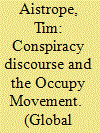

|
|
|
|
|
| Publication |
2013.
|
| Summary/Abstract |
Conspiracy theory has come up frequently in general media commentary around the Occupy Wall Street movement. For all their good intentions, Occupy is hampered by a paranoid style of populism that sees nefarious elites behind everything - or so the story goes.1 This paper takes the conspiracy discourse around Occupy as an entry point into the underlying dynamics of power and interpretation that help set the conditions of possibility for dissent in the liberal context.
|
|
|
|
|
|
|
|
|
|
|
|
|
|
|
|
| 4 |
ID:
118020
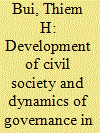

|
|
|
|
|
| Publication |
2013.
|
| Summary/Abstract |
Civil society has been in operation under one-party rule in Vietnam in the years since the Doi Moi (renewal) in 1986. Despite the continued monopoly of political power by the Communist Party of Vietnam (CPV), civil society has been gradually expanded and developed. The paper reviews recent arguments in the political science and area studies literature on the emergence of civil society in Vietnam's Doi Moi period over the past two decades, to comment on the dynamics of the relationship between civil society and the party-state, problematizing the development of civil society in the context of a one-party-dominated state. At a certain level, civil society has been 'tolerated', 'endorsed', or recognized by the party state to fill a gap in the governance network. In practice, it has never been an easy project for civil society to make its way into Vietnamese society given the party-state's Gramscian concession to maintain the existing hegemony.
|
|
|
|
|
|
|
|
|
|
|
|
|
|
|
|
| 5 |
ID:
118019
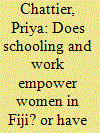

|
|
|
|
|
| Publication |
2013.
|
| Summary/Abstract |
The paper explores the limitations of the theoretical presumptions underlying the relationship between empowerment, education and employment that have been emphasized in both the existing literature and the current rhetoric to 'empower' women in developing countries. The research uses findings from in-depth interviews and focused group discussion data to empirically examine the relationship between schooling, paid work and empowerment of women in Fiji. The paper argues that the relationship between education, work and empowerment is conditioned by gender norms surrounding women's and men's choices on key economic decisions. The findings demonstrate that cultural norms about gender roles are considered to persist, generating gender inequality despite women's and girl's education and employment. Empirical evidence makes a strong case for the need to move away from broad-based conceptualizations of women's empowerment to an analysis of the social construction of gender as both a conceptual and an empirical category of inquiry.
|
|
|
|
|
|
|
|
|
|
|
|
|
|
|
|
| 6 |
ID:
118025


|
|
|
|
|
| Publication |
2013.
|
| Summary/Abstract |
Quick vignettes on the meaning of political events are an undertaking fraught with risks. Not least by facilitating overstatements, biases, and shortcuts, the latter both empirically and conceptually. What follows here should therefore be seen as nothing more than an offer of one way of framing an inquiry into the question of what the significance of the Occupy movement has been. It is emphatically not an attempt to cook the movement by way of reduction into an 'explanatory hotel-sauce' (taking Adorno's much loved phrase out of context here), to be poured retrospectively over events to make them analytically palatable. Rather than detracting from the diversity of experiences, modes of engagement, imaginaries, and resilience developed in very different sites and situations by people associating with, or inspired by, the 'Occupy' meme, I am simply trying to home in on one particular aspect, which, I think, may contain some hints about the continuities of the political concerns to which the 'events' side of Occupy gave voice, visibility, and exposure.
|
|
|
|
|
|
|
|
|
|
|
|
|
|
|
|
| 7 |
ID:
118026
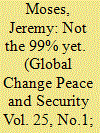

|
|
|
|
|
| Publication |
2013.
|
| Summary/Abstract |
In September of 2000, I took part in the 'S11' protests in Melbourne during the World Economic Forum (WEF). Following in the wake of the 'Battle in Seattle' protests the preceding year, S11 was understood as a continuation of the push by 'the people' against the anonymous and destructive forces of global finance, underpinned by principles of neo-liberal globalization. I recall with particular clarity the events of one night during the WEF when, heading back to our motel after a long day of festivities and confrontations, we saw a rush of people toward one of the entries to the Crown Casino. It soon became apparent that some forum participants were either coming or going at this time and this became one of many flashpoints for conflict between protestors and police. Taking my place face to face with riot police and the horses on which some of them were mounted, the situation quickly intensified. There was a certain buzz to be had from facing off with police in this way; coming face to face with the visible face of sovereignty and screaming abuse at it. It was a moment in which we thought we knew what it was like to see through the mask of liberal democracy and experience the reality of a police state.
|
|
|
|
|
|
|
|
|
|
|
|
|
|
|
|
| 8 |
ID:
118024
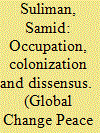

|
|
|
|
|
| Publication |
2013.
|
| Summary/Abstract |
In spite of a set of central unifying claims, the Occupy movement has generated a powerful challenge to the hegemonic politico-economic order through the expressive and transgressive act of occupation. Through such an act, occupy (verb) has become transformed into Occupy (noun): a resistance politics concerned with (re)claiming physical spaces and creating representational spaces. Following on the heels of the popular uprisings characterized as the 'Arab Spring', Occupy seemed to represent - even embody - the moment of democratic reflexivity where, if only just for a moment, the cracks in the façade of liberalism opened up just a little further, exposing the bonds between the decades-old frustrations of postcolonial subjects and the shattered hopes of democratic citizens. Occupy irrupted into the sacred space of global capitalism, and spread from Lower Manhattan to town squares and city centres the world over.
|
|
|
|
|
|
|
|
|
|
|
|
|
|
|
|
| 9 |
ID:
118022
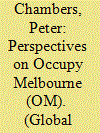

|
|
|
|
|
| Publication |
2013.
|
| Summary/Abstract |
I did but see her passing by, and yet I love her till I die
- Prime Minister Robert Menzies, quoting Thomas Ford, on the occasion of Queen Elizabeth's visit to Canberra, 1963
Vires acquirit eundo (she gathers strength as she goes)
- motto of the City of Melbourne
Occupy Melbourne (OM) took place between 15 and 21 October 2011 at City Square, Melbourne,1 in solidarity with the series of Occupy protests that took place in the US and Britain around the same time, and that are notionally ongoing on an indefinite basis.
|
|
|
|
|
|
|
|
|
|
|
|
|
|
|
|
| 10 |
ID:
118021


|
|
|
|
|
| Publication |
2013.
|
| Summary/Abstract |
One of the most important legacies of the Occupy Movement is the positive impact it has had on political discourse. In light of what at face value seems to be a thorough routing of formal organizations of Occupy, and a similar erosion of its public appeal, it has nonetheless had a significant impact on political debate, globally. These effects are still evident today, despite the fact that, to the best of my knowledge, the Occupy Movement was not mentioned by either presidential candidate in any major speech or policy announcement during the recent 2012 US election.
|
|
|
|
|
|
|
|
|
|
|
|
|
|
|
|
| 11 |
ID:
118017


|
|
|
|
|
| Publication |
2013.
|
| Summary/Abstract |
Environmental challenges are often transnational and affect the daily lives of people as well as broader national interests. This research paper focuses on the challenge of finding a balance between economic development and environmental degradation in the Mekong subregion and assesses the role of regional institutions in dealing with this issue. Finding a balance is important, because more than 70 million people live on the river banks and the subregion is crucial for the economic development of its six riparian countries. Concentrating on two organizations - the Mekong River Commission (MRC) and the Greater Mekong Subregion (GMS) - this article argues that regional attempts to find a balance have so far largely failed. Reasons for this lack of success include the MRC's failure to include all riparian countries, and the fact that the GMS has only recently widened its focus from economic development to also include environmental and social issues.
|
|
|
|
|
|
|
|
|
|
|
|
|
|
|
|
| 12 |
ID:
118016


|
|
|
|
|
| Publication |
2013.
|
| Summary/Abstract |
Since the late 1950s, Sino-Indian relations have been tense and marked by rivalry for regional supremacy. Complex border disputes, which escalated into war between the former 'bhai-bhai', staged the first round of their increasingly fierce rivalry. The second round followed suit within the structural framework of the Cold War when India sided with the Soviet Union while China partnered with Pakistan and later the USA. The changing post-Cold War power structure in Asia opened the third round of intensifying Sino-Indian supremacy competition, underlined by conflicting resource interests. Emerging arenas of competition are the seas between the Indian Ocean and the South China Sea - areas with significant hydrocarbon resources and vital lanes of international trade. Using Lateral Pressure theory, this article argues that maritime Asia ranks high in Beijing's and New Delhi's strategic calculations and because both emerging powers increasingly interfere in the other's maritime backyard, these seas are becoming potential arenas of military escalations.
|
|
|
|
|
|
|
|
|
|
|
|
|
|
|
|
| 13 |
ID:
118027
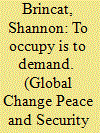

|
|
|
|
|
| Publication |
2013.
|
| Summary/Abstract |
The question of making demands has become somewhat fetishized in the Occupy Movement, the one thing endlessly debated in each local occupation and in nearly all journalistic or academic commentaries on the phenomena. This is not without good reason. For to 'demand' presupposes at least two things: that there is a coherent object of need or desire to be obtained, and that there is some person, body or institution that can grant it. Neither presupposition however, holds in the context of Occupy, whose aims, make-up and decision-making processes change from city to city, and from person to person involved within it. While opposition to income in equality and control of financial institutions over public life are common themes, as is direct action and dialogic internal forms of consensus-building, these do not permit a definitive set of oppositional demands, at least in the traditional political sense. Occupy, then, is a hitherto unknown form of political expression.
|
|
|
|
|
|
|
|
|
|
|
|
|
|
|
|
|
|
|
|
|